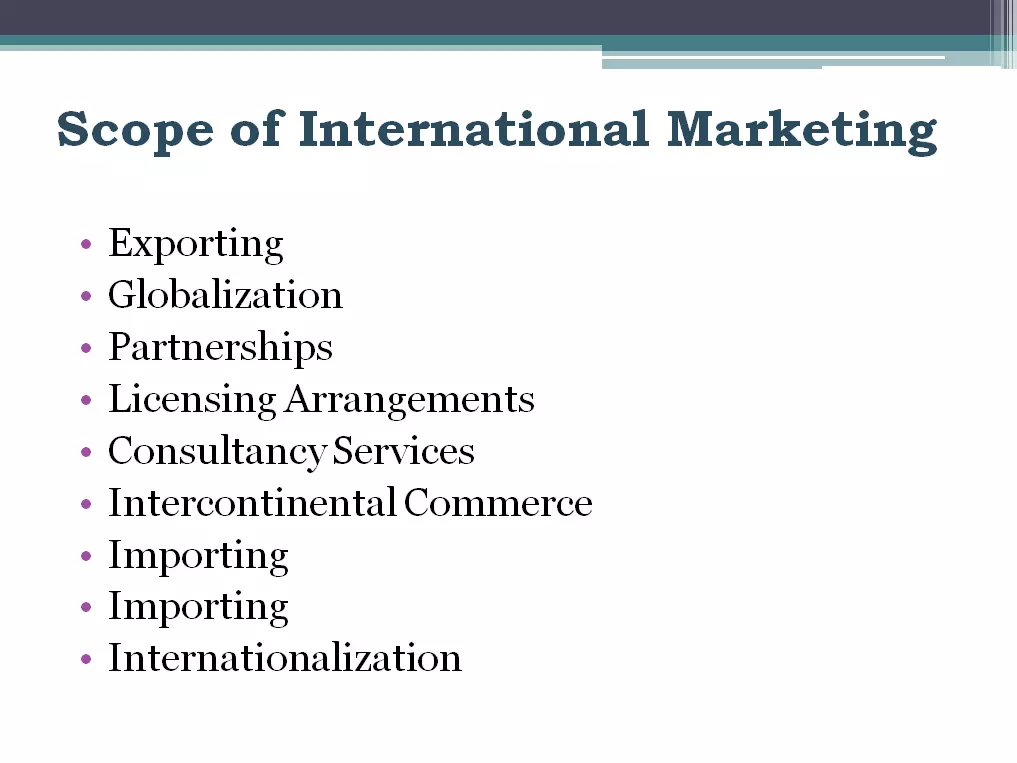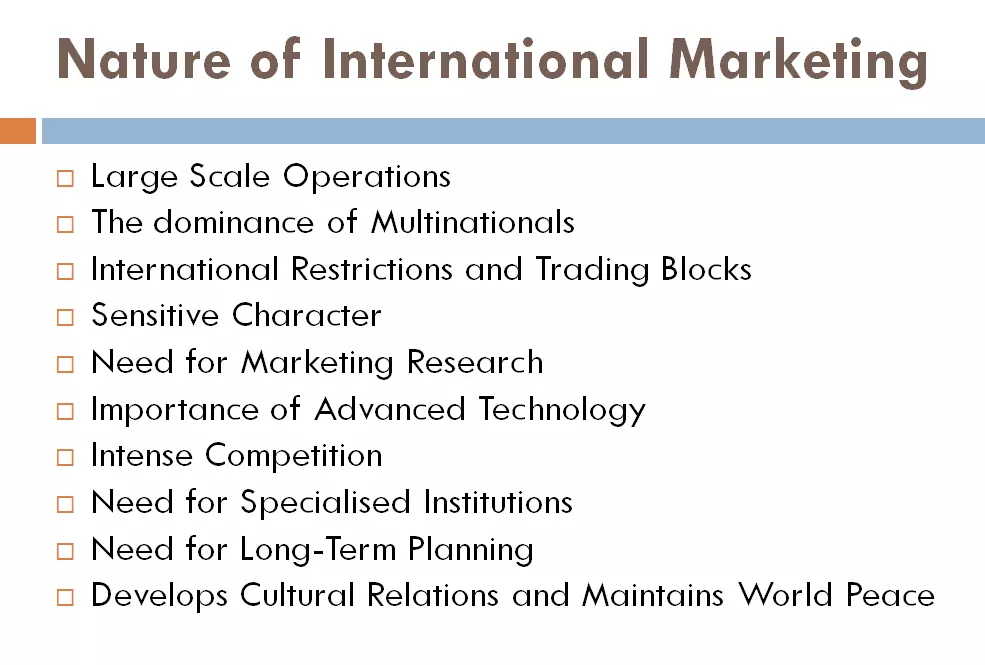Table of Contents:
- Scope of International Marketing
- International Marketing Meaning
- Definition of International Marketing
- Nature of International Marketing
Scope of International Marketing
Understanding the scope of international marketing is important for companies aiming to expand their reach and make the most of the global market. The scope of international marketing is all about how companies sell their goods in different countries. It’s not just about the advertisement of products; it involves a lot of things like understanding foreign markets, adapting to various cultures, and making intelligent decisions.
 The scope of international marketing is explained as follows:
The scope of international marketing is explained as follows:
- Exporting
- Globalization
- Partnerships
- Licensing Arrangements
- Consultancy Services
- Intercontinental Commerce
- Importing
- Re-exporting
- Internationalization
1) Exporting
Exporting is the business strategy of selling goods and services to foreign markets. Whether the company is small or big exporting can always be a valuable strategy for achieving long-term growth and success. The exporter executes many activities other than exporting goods and services.
2) Globalization
Setting up a branch in a foreign market for processing, packaging or assembling goods as per the market’s needs can be a strategic move for businesses that are looking to expand their reach and meet the specific needs of the market. It involves processing, packaging, and assembling of goods to meet the demands of local consumers.
3) Partnerships
Joint Ventures and collaborations involve the establishment of partnerships between foreign countries and MNCs for the manufacturing and marketing of products and services. Through joint ventures and collaborations, companies can collaborate with foreign firms to effectively penetrate international markets.
4) Licensing Arrangements
The company, under this system of businesses, establishes licensing arrangements with the foreign term whereby foreign enterprises are granted the right to use the exporting company’s know-how, viz., patents, trademarks or processes according to the terms of the agreement with or without financial investment.
5) Consultancy Services
Consulting services are offered by specialized professionals from export companies who share their expertise and experience with businesses seeking to address specific challenges or achieve goals. Export companies offer consultancy services by undertaking turnkey projects abroad.
6) Intercontinental Commerce
International marketing involves the exchange of goods and services between countries as well as the transfer of technical and managerial knowledge from the exporting company to the importing company. The technicians and managerial personnel of the exporting companies guide and train the technicians and managers of the importing companies. To ensure that the importing company is equipped with the necessary skills and knowledge to effectively use the products or services being imported, leading to a successful business relationship between the two companies.
7) Importing
Import refers to the act of buying goods from a foreign country for commercial purposes. However, in specific cases, national accounts give effect to changes in ownership even when there is no change in ownership in legal terms (for example, cross-border distributions between associates of the same enterprise, cross-border financial leases, significant ordering or repairing cross-border goods for processing). Also smuggled goods should be included in the import measure.
Import of services includes all services provided by non-residents to residents. In national accounts, any direct purchases made by residents outside a country’s economic zone are recorded as imports of services. Therefore all expenditure incurred by tourists in the economic zone of another country is considered as part of the import of services. International flows of illegal services should also be considered.
8) Re-exporting
Re-exporting refers to the process of importing semi-finished goods and subsequently exporting final goods. It involves re-engineering commodities for export purposes. This practice is generally used by businesses seeking to optimize their supply chain and reduce costs. By importing semi-finished goods and adding value through further processing or assembly, companies can produce higher-quality products at lower costs.
9) Internationalization
i) Operating marketing and sales facilities abroad.
ii) Establishing assembly or production facilities in foreign nations.
iii) Formation and organization of trade block and settlement of external payment.
iv) Creating licensing and joint venture arrangements.
v) Offering management contracts (consultancy) and undertaking turnkey projects abroad.
vi) Foreign Exchange Arrangement and Management.
vii) Understanding country-wise and commodity-wise tonnes of marketing by case to case.
viii) Monitoring the operation of marketing practices of multinationals and other agencies. Development of e-marketing.
ix) Promotional and development role of agencies engaged in marketing practices.
x) National global policies for international marketing.
Thus, the scope of international marketing is not static but fully dynamic; it depends upon global level changes, national level changes, policy level changes and organisational level changes. The dynamism of international marketing varies from country to country, trade block to block, and company to company.
International Marketing Meaning
International marketing also known as multinational marketing is the marketing of products or services across national boundaries. It includes activities that direct the flow of goods from one country to another to meet customers’ requirements.
International marketing is somewhat similar to export management. However, export management involves managing the flow of goods and services from the host country to the guest country, whereas international marketing covers finance, production, and personnel activities. It also entails several post-sales activities.
It may consist of exporting goods from one country to another, or it may refer to companies that both produce and market in more than one country. International marketing is different from international trade. Only a part of the global trade flows represents international marketing.
Related Articles:
- nature of business meaning
- nature of international business
- determinants of economic development
- nature of capital budgeting
Definition of International Marketing
According to AMA (American Marketing Association), “International marketing is the multinational process of planning and executing the conception, pricing, promotion, and distribution of ideas, goods, and services to create exchanges that satisfy individual and organisational objectives”.
According to Warren J. Keegan, “International marketing is the process of focusing the resources and objectives of an organisation on global marketing opportunities and needs”.
International marketing involves:
1) Determining the needs and wants of customers in international markets,
2) Making marketing mix decisions related to product, pricing, distribution, and communication while keeping in view the diverse consumer and market behaviour across different countries on the one hand and firms’ goals towards globalization on the other hand.
3) Expanding into international markets through various modes of entry.
4) Making decisions given the dynamic international marketing environment.
International marketing refers to the execution performance of business activities that direct the flow of goods and services to people in multiple nations. It is different from domestic marketing in as much as it involves cross-border transactions, which entail different markets and consumers with varying needs, wants, and behavioural characteristics.
Related Article: Modes of Entry into International Business
Nature of International Marketing
The nature of international marketing can be understood through the following points:
- Large Scale Operations
- The dominance of Multinationals
- International Restrictions and Trading Blocks
- Sensitive Character
- Need for Marketing Research
- Importance of Advanced Technology
- Keen and Acute Competition
- Need for Specialised Institutions
- Need for Long-Term Planning
- Develops Cultural Relations and Maintains World Peace
 1) Large-Scale Operations
1) Large-Scale Operations
Large-scale operations refer to extensive business activities that involve a wide range of resources, including capital, technology, manpower, and tangible assets. International marketing transactions are always conducted in large quantities rather than on a retail basis. This approach is necessary to effectively secure the advantages of large-scale operations, particularly in terms of transportation, handling, and warehousing. It requires careful planning, diligent monitoring, efficient execution, and evaluation to assure optimal outcomes.
2) Dominance of Multinationals Corporations
Multinational companies have established their dominance in international marketing businesses. MNCs have a vast network of worldwide contacts, allowing them to conduct business operations more efficiently and economically by utilizing existing infrastructure and resources to produce goods or services for the global market. MNCs have international marketing success and they are in a better position to adopt a global approach because of their access to capital, advanced technology and economies of scale. Multinational corporations usually market their products in a large number of different countries compared to smaller local businesses and thereby dominate developing countries.
3) International Restrictions and Trading Blocks
Unlike domestic marketing, international marketing is not entirely free from restrictions and barriers due to the protective policies followed by different countries. These restrictions come in the form of tariffs and non-tariff barriers, which are implemented by almost all countries to protect their interests. Many countries also impose foreign exchange regulations to restrict imports and exports. Additionally, various trading blocs such as CMEA, ASEAN, and LAFTA also restrict the scope of international marketing. These blocs impose artificial barriers on the free movement of goods and services among the countries.
4) Sensitive Character
International marketing is a dynamic and adaptable field that requires sensitivity and flexibility. The success of a product can be impacted by many factors such as political and economic changes, sudden shifts in consumer preferences, advancements in technology by competitors, etc. Even the use of advanced technology or the introduction of new product by competitors can impact sales significantly. Therefore, international marketers need to stay informed and agile to capitalize on opportunities and navigate these challenges.
5) Need for Marketing Research
Market research is used by companies to gather data and learn more about the target audience. This enables businesses to market themselves more effectively and, ultimately, succeed in the market. It is required in international marketing due to several reasons such as marketing surveys, for making informed decisions about new product development, product pricing strategies, promotional activities, product surveys and product testing.
6) Importance of Advanced Technology
The use of advanced machinery and tools has improved the production and marketing of goods. Companies are now able to export, promote, and capture the world market, enabling them to sell superior quality goods at competitive prices. Keeping the employees more focused on work and tracking the manufacturing processes has become easier with the developments in technological inventions. The accessibility of technological advancements such as social media, e-commerce sites or even virtual events has made it possible to advertise products or services globally without a physical presence in the market.
7) Intense competition
Intense competition in international marketing is a common rivalry between companies selling similar goods or services to increase revenue, profit and market share. The nature of the competition in international marketing varies across countries, depending on factors such as economic conditions, cultural differences, and regulatory frameworks.
8) Need for Specialised Institutions
International marketing is risky and complicated and involves lengthy procedures and formalities. Access to professional experts is essential as they can guide various aspects of international marketing. Similarly, financial support is also necessary. Specialized institutions such as indent houses, exchange banks, and export houses have been established across the world to facilitate effective participation in international marketing.
9) Need for Long-Term Planning
International marketing requires long-term planning. It is often influenced by many social, economic, and political environment factors. Companies need to engage in long-term planning to ensure success in this field. Comprehensive and dynamic marketing programs can be developed through such planning.
10) Maintains World Peace and Develops Cultural Relations
International marketing plays a vital role in promoting cultural relations and world peace. It brings different countries closer together and develops cultural relations among them by facilitating the exchange of ideas, values, and traditions, ultimately leading to a better understanding and appreciation of diverse cultures. This, in turn, improves the quality of life for people in foreign nations, as they are exposed to new perspectives and ways of thinking.
You May Also Like:-
- Nature of International Business
- Factors Affecting International Business
- Determinants of Economic Development
- International Business Environment
- Complexities of International Business
- Difference between Domestic and International Business
- Importance of International Business
- Modes of Entry into International Business
- International Trading Environment
- Socio Cultural Environment
- Balance of Payment
- International Commodity Agreements
- Special Economic Zone
- Service Recovery System
- Foreign Exchange Market
- World Bank Headquarters
- United Nations Conference on Trade and Development
